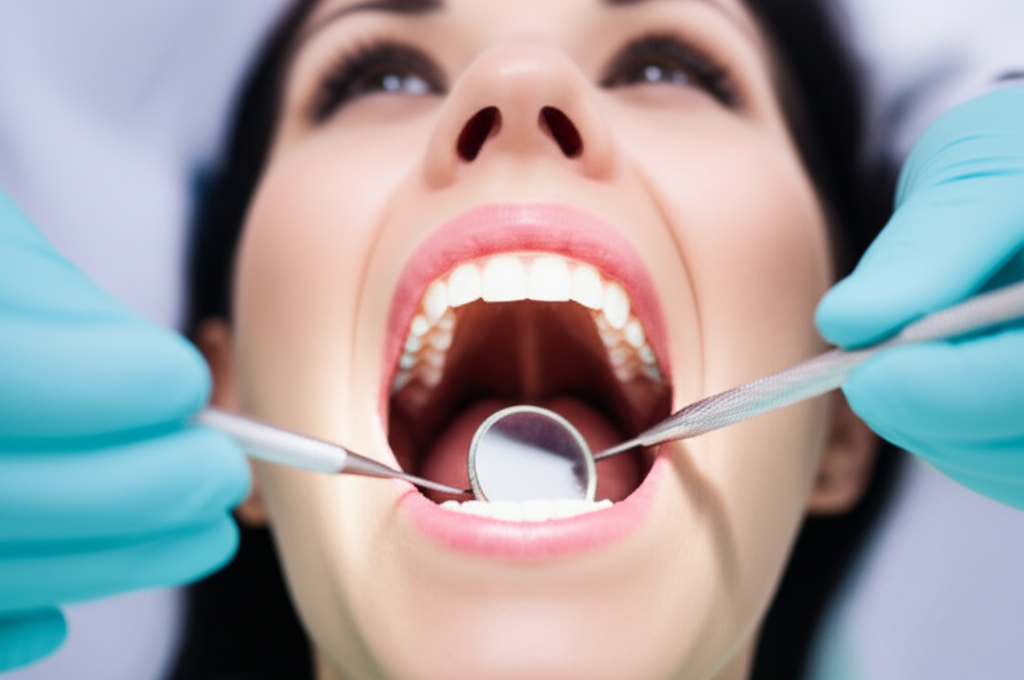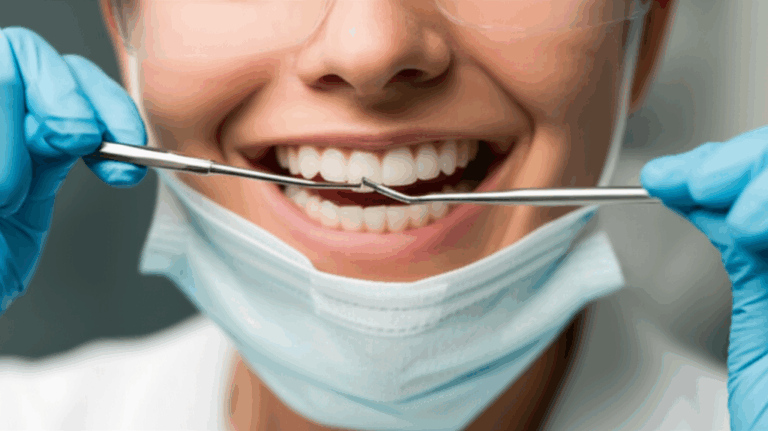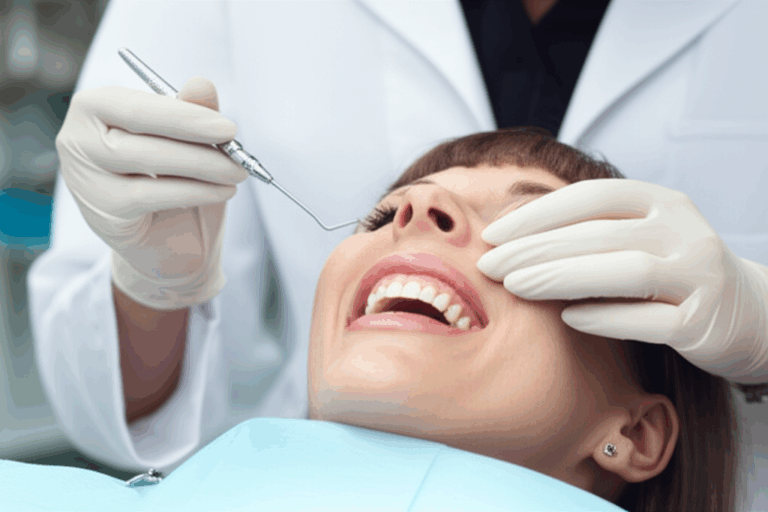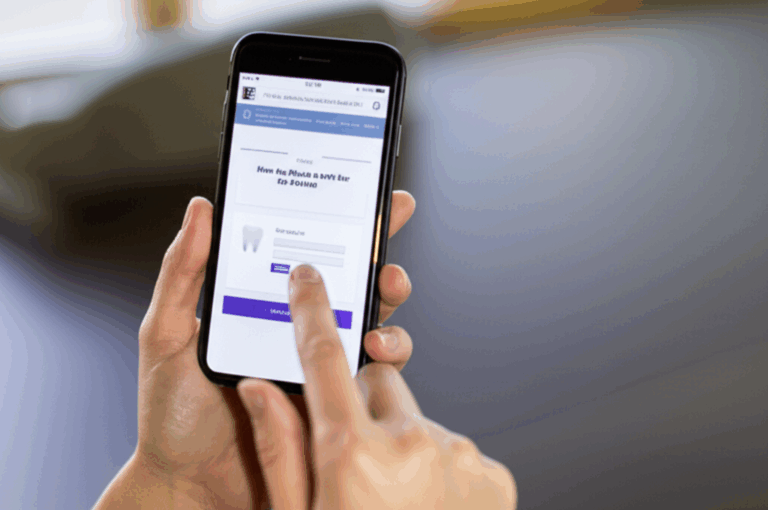
How to Keep Your Mouth Open at the Dentist: Practical Tips for a Comfortable Visit
Question: “How do I keep my mouth open at the dentist without pain?” You’re not alone in asking this. Many people have problems with jaw tiredness, a sensitive gag reflex, dry mouth, or nervousness about dental visits. These problems can make a normal appointment feel very hard. You want healthy teeth, but you also want to leave the dentist without a sore jaw. The good news? You can have both.
In this guide, I’ll explain why holding your mouth open is hard, what happens inside your jaw, and what you can do before, during, and after your visit to stay comfortable. We’ll look at simple things you can do yourself as well as things like sedation dentistry for people who need more help.
Table of Contents
- Why It’s Hard to Keep Your Mouth Open (Is This Normal?)
- What’s Really Happening: The Simple Science of Jaw Tiredness and Worry
- What You Can Do: Before, During, and After Your Visit
- Advanced Solutions if You’re Still Struggling
- What Science and Real People Say
- Who This Helps: Are You a Good Fit for These Tips?
- Takeaway: Easy Steps To Try Today
- FAQs: Quick Answers
Why It’s Hard to Keep Your Mouth Open (Is This Normal?)
Short answer: Yes, it’s normal. You use your jaw to talk, eat, yawn, and laugh—but you don’t hold it open very long. Dental treatments can last 30 to 90 minutes or more. This puts stress on your jaw muscles and joints (TMJ). If you already have jaw pain or tiredness, this is even harder. Worry can make your muscles tight, a strong gag reflex gets in the way, and dry mouth can make everything worse.
You might notice:
- Jaw tiredness during or after a cleaning or filling
- Mouth pain after the dentist
- Clicking or tightness in the jaw joint (TMJ) after long appointments
- Feeling like you need to swallow or gag when tools touch certain places
- Clenching your teeth from stress
- Trouble keeping your tongue out of the way
This doesn’t mean you can’t get dental care. It just means you need a comfort plan. Small changes can help so you can keep your mouth open without pain and feel okay after.
What’s Really Happening: The Simple Science of Jaw Tiredness and Worry
Think of your jaw like a door that stays open thanks to strong hinges and springs. The hinges are your jaw joints (TMJ) by your ears. The springs are muscles (like the masseter and temporalis) that help your lower jaw move. When you open wide and keep it that way, these muscles hold still and get tired fast. That’s why your jaw gets sore.
The parts at work
- TMJ (Jaw Joint): The moving joint near your ear that helps you open, close, and move your mouth. It can get sore if you keep your mouth open.
- Jaw muscles: The main muscles for chewing. They work hard if you keep your mouth open for a long time.
- Face muscles and tissues: Help your lips, cheeks, and tongue. These can get tight if you’re nervous or tired.
- Jaw bones: These are your upper and lower jawbones. They need to be supported well to feel comfortable.
- Trismus: This is when your mouth can’t open much because of muscle spasm or jaw problems. Sometimes this happens after long dental visits.
Things that make it harder
- Dental worry or fear: Feeling nervous about the dentist makes your nervous system go on high alert. Muscles tighten and you might gag more.
- Gag reflex: This is your body’s way to keep things out of your breathing tube. Tools in your mouth can make you gag.
- Dry mouth: Medicines and health problems can make your mouth dry. This makes swallowing hard. A dry mouth can make dental dams (a rubber shield dentists sometimes use) feel really weird.
- Long appointments: Things like root canals, crowns, wisdom teeth, and braces can take a long time. The more tired your jaw, the harder it gets.
- Clenching: Stress can make you clench your teeth, even during the dentist.
Dental tools that help (or sometimes don’t)
- Bite block (mouth prop): This rests between your teeth so your jaw muscles can relax. It’s a simple, super-helpful tool.
- Suction straw: This keeps your mouth dry and cuts down on saliva so you don’t have to swallow as much.
- Dental dam: It covers your teeth to keep things clean but can feel strange at first. Many people like it because it keeps water away from the back of your mouth, reducing gagging.
- Special supports: Some dental chairs have better pillows or rolls to help your head and jaw feel better.
What You Can Do: Before, During, and After Your Visit
We’ll break this into three simple parts: at home, in the chair, and after your visit.
Before your appointment: Make a plan
- Talk with your dentist
- Let the dentist and hygienist know if you’ve had jaw pain, TMJ trouble, a strong gag reflex, dry mouth, or worry about the dentist. This helps them plan to make you more comfortable.
- Ask about bite blocks, hand signals, taking breaks, listening to music, numbing jelly for sensitive mouths, and even sedation. Good dentists want your questions.
- Warm-up with jaw stretches
- The day before and day of your appointment, gently open and close your jaw 10 times. Move your jaw side to side. Put a warm pack near your jaw joint for about 5-10 minutes. If you already know you have TMJ, ask your dentist before doing these.
- Try opening wide for a few seconds at a time, then relax.
- Drink water and eat right
- Drink enough water before you go. That helps with dry mouth.
- Don’t eat chewy or hard foods right before your visit—you want your jaw rested.
- Handle anxiety ahead of time
- Try deep breathing: Breathe in slowly for 4 seconds, hold it, breathe out for 6 seconds. Do this a few times before your appointment.
- Listen to your favorite music if you’re nervous. Picture yourself leaving the dentist feeling relaxed.
- Don’t drink too much coffee since it can make you even more nervous.
- If you need, ask your dentist or doctor about medicine for anxiety (never take anything new without a doctor’s okay).
- Special situations
- Seniors: Dry mouth and jaw pain are normal. Drink more water and take breaks. Tell your dentist about all your medicines.
- Pregnant: Second trimester is usually safest for dental work. Use pillows and take breaks as needed. Talk with your dentist and OB first.
- Special needs: Ask about longer appointments, getting to know the office before your appointment, or medicine to help relax.
During your appointment: Stay comfortable
- Use dental helpers
- Bite blocks: Let your jaw muscles rest. They come in different sizes—ask if it bothers you.
- Jaw supports: Soft pillows or neck rolls can really help.
- Talk with your dental team
- Use hand signals: thumbs up = “okay,” two taps = “please stop for a second,” palm out = “stop.” Set these up before the appointment so you feel in control.
- Take breaks before your jaw gets too tired—a few short rests are better than waiting till you’re worn out.
- Relax your body
- Breathe through your nose if you start to panic.
- Try gently tensing your shoulders, hold for 5 seconds, then let go. Work down your arms and body—nobody will notice.
- Distract yourself: headphones for music, watch TV if the office has one, or just try counting in your head.
- Handle mouth problems right away
- Dry mouth: Ask for a quick rinse. Some places have fake saliva or moist gauze to help.
- Gag reflex: Breathe through your nose. Ask for numbing medicine on the back of your tongue. Push your thumb into your palm or lift your foot a little to give your brain something else to think about. A dental dam can also help.
- Tongue: Ask the assistant to help guide your tongue or use a suction straw.
- Pain control and comfort
- Tell your dentist right away if anything hurts. More numbing medicine can help your muscles relax because you won’t tense up.
- Ask if you can adjust your head or neck—sometimes just a little change makes a big difference.
After the appointment: Help your jaw recover
- Help sore muscles
- Gently rub your jaw and temples in small circles for a few minutes with clean hands.
- Use a warm pack (or ice if you like) for about 10-15 minutes.
- Take over-the-counter pain meds if your doctor says it’s okay.
- Go easy on your jaw
- Eat soft foods like yogurt, eggs, or soup for the rest of the day.
- Try not to talk a lot or yawn big for a day or two.
- Call your dentist if needed
- If you get strong pain, swelling that gets worse after two days, or you suddenly can’t open your mouth much, call your dentist. Rarely, the jaw joint can move out of place—don’t wait to get help.
Advanced Solutions if You’re Still Struggling
Sometimes simple fixes aren’t enough. That’s okay.
Ways the dentist can help you relax
- Laughing gas (nitrous oxide)
- You breathe through a mask. You stay awake but feel calm and your muscles relax.
- Works fast, goes away quickly, and you can usually drive yourself.
- Not for everyone—ask if it’s safe for you.
- Sedation by mouth (oral)
- You take a pill before your visit. You feel relaxed but are still awake.
- Good for more worry or longer appointments like crowns or root canals. You’ll probably need someone to drive you home.
- IV sedation
- Medicine through a small tube in your arm so you’re very relaxed and don’t remember much.
- Great for people who are very worried or having long visits. You need a ride home.
- Being asleep (general anesthesia)
- Used for surgeries or for people who can’t handle being awake at all.
- Special places and very careful checks are needed.
Always tell your dentist about your health, allergies, and all your medications. If your jaw muscles spasm a lot, ask about medicine to help relax them.
Pick the right dental team
- Find a dentist who cares about your comfort—lots of places now have music, breaks, and more comfortable chairs. Read reviews about kindness and clear talking.
- For special treatments, you might see a gum doctor (periodontist), root canal doctor (endodontist), tooth-restoring dentist (prosthodontist), braces doctor (orthodontist), or oral surgeon for big procedures.
- Many dental offices work with special labs for making things like crowns, bridges, and night guards. If you need a night guard for clenching, ask about their night guard dental lab.
Tips for specific procedures
- Wisdom teeth: Use a strong mouth prop. Take breaks if it’s taking a while. Ice after helps with swelling.
- Root canals: Dental dam can actually help stop you from gagging. Use a bite block if you’re open a long time.
- Crowns and bridges: Plan on using a bite block and take breaks. If you get several teeth done at once, ask about doing them in stages. Many dentists use a trusted crown and bridge dental lab so the fit is right for your bite.
- Veneers: Numbing and gentle shields help, but these visits can be long. Bring music and set up hand signals.
- Dental implants: Good jaw positioning and numbing meds help. Talk about what to expect and how to feel better after.
- Braces and aligners: Braces can hurt after adjustment; wax or saltwater rinses can help. Clear aligners are thinner and might feel better during treatment.
What Science and Real People Say
Here are a few things we know:
- Dental worry is super common. About one out of three adults feels nervous about the dentist. Worry makes your muscles tighten and your gag reflex stronger.
- Jaw pain is normal. Lots of people have jaw aches at some point. Opening wide for too long makes this worse, so breaks are smart.
- Gag reflex is different for everyone. About half of people gag at the dentist sometimes. Breathing through your nose, numbing, and distractions often help.
- Mouth props (bite blocks) work. Most people like bite blocks for longer visits because they hold your mouth open for you.
- Sedation is easy to get. Many places offer laughing gas or pills to help you relax.
- Talking helps. If patients know they can stop or take breaks, they feel calmer and their jaw relaxes.
- Dry mouth happens a lot. Many adults have dry mouth from medicines or other reasons. Rinse breaks and drinking water help.
To learn more, look at the American Dental Association (ADA) or the National Institute of Dental and Craniofacial Research (NIDCR).
Who This Helps: Are You a Good Fit for These Tips?
These ideas are good for you if:
- Your jaw gets tired or hurts during or after dental work
- You have jaw pain or TMJ
- You gag easily
- You get dry mouth from medicines or health problems
- You worry about the dentist
- You clench or grind your teeth (bruxism)
- You need long appointments like root canals, crowns, bridges, veneers, or implants
- Your child worries about the dentist
- You’re pregnant and want to be more comfortable
- You have chronic pain and want to avoid flare-ups
- You or your loved one has special needs and need more time, sedation, or gentle care
If you have very painful jaw problems, can’t open your mouth much, or have jaw locking, talk to your dentist. You might need a custom plan and a jaw specialist. Many dentists work with a special crown and bridge dental laboratory for custom solutions.
Takeaway: Easy Steps To Try Today
Before your visit
- Tell your dentist about jaw pain, worry, gagging, or dry mouth. Ask for a bite block and hand signals.
- Gently stretch your jaw and use a warm pack for 10 minutes.
- Drink water and avoid too much coffee.
- Bring headphones with your favorite music.
During your visit
- Use a mouth prop and ask for breaks before you’re tired.
- Breathe through your nose and try relaxing your body.
- Ask for numbing gel if your gag reflex kicks in. Request extra rinses for dryness.
- Adjust your head or neck support if something feels off.
After your visit
- Gently massage your jaw and use heat or a cold pack for 10–15 minutes.
- Eat soft foods. Try not to yawn big or talk a lot right away.
- Take over-the-counter pain medicine if your doctor says it’s okay.
- Call your dentist if you have pain, swelling, or trouble opening your mouth.
Remember, your body just needs a little extra help. With some simple changes, you can keep your mouth open and get the dental care you need.
FAQs: Quick Answers
Q: How long can I keep my mouth open at the dentist?
A: It depends. Some people can go 30–45 minutes, but others need breaks every 10–15 minutes. A bite block helps most people go longer without getting sore. Take short breaks before you’re exhausted.
Q: Will a bite block hurt my teeth or jaw?
A: It shouldn’t. If it feels sharp or too hard, ask for another size or type. Most people feel better with it.
Q: What if I have TMJ?
A: Tell your dentist. Request a bite block, more breaks, and good support for your neck. Warm packs help before and after. Some people benefit from a custom night guard dental lab device if they clench at night.
Q: Can I ask for sedation if I’m very nervous?
A: Yes. Laughing gas, pills, or IV medicine can help. Your dentist will help you pick what’s safe and right for you.
Q: What if I gag easily?
A: Breathe through your nose and ask about numbing gel. Distraction helps. Dental dam and small suction straws often work. Tell your dental team so they can help.
Q: I’m scared of needles.
A: You’re not alone. Numbing gel can help before shots. Dentists can go slowly. Try deep breathing or music to relax.
Q: My mouth gets dry at the dentist. What can I do?
A: Drink water before your visit. Ask for rinse breaks or saliva substitutes. Review your medicines with your dentist.
Q: Are these tips safe during pregnancy?
A: Most are safe, like positioning, breaks, hydration, and bite blocks. Always double-check medicines with your dentist and OB doctor.
Q: What should I do after a long dental visit so my jaw isn’t sore?
A: Use heat or ice, gentle massage, eat soft foods, and avoid big yawns. If it still hurts or your jaw is stuck, call your dentist.
Q: Who do I see if I have a complex problem?
A: Your regular dentist can send you to a gum, root canal, special restoration, braces, or surgery specialist if needed.
Extra Comfort Tips
- Simple breathing and relaxing your muscles help during any dental treatment. Imagining a calm place can also make you feel more in control.
- Some offices have music, aromatherapy, soft blankets, and eye masks—ask if these can help you relax.
- “Gentle” or “minimally invasive” dentistry can mean less time in the chair. These dentists care about things like posture and body tension.
- For more support after a visit, talk to your dentist about prescription pain relief if over-the-counter isn’t enough.
A Note on Jaw Health
If you have jaw pain or headaches from clenching, talk with your dentist. A custom night guard can protect your jaw and teeth. Dentists often use a special night guard dental lab for a good fit.
You can have a more comfortable dental appointment—even if you’ve had trouble before. Start with one of the easier changes, like asking for a bite block or bringing music. If you still struggle, talk to your dentist about more support. One step at a time, you’ll feel better and more confident each visit.
Disclaimer:
This article is general information. It doesn’t replace advice from your dentist or doctor. Always talk with a dental professional about your own symptoms or before trying new medicines or treatments. If you have swelling, pain, or can’t open your jaw, call your dentist right away.








